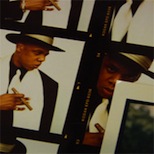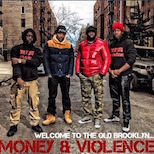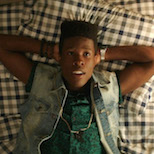W. Kamau Bell On His New Show, Chris Rock and Dave Chappelle
08.13.2012
LEISURE
It’s funny what a major co-sign can do for one’s career. After years of grinding on the comedy circuit, San Francisco-based comedian W. Kamau Bell finally met Chris Rock, and Rock finally met Bell’s work. A couple years later, Bell debuted his FX TV series, Totally Biased With W. Kamau Bell – executive prodcued by Rock. The show which is shot on Brooklyn, premiered last Thursday, and features Bell touching on a wide range of topics from politics to race to culture.
Life+Times caught up with Bell to discuss his show and his journey over the past few years.
Life+Times: What’s the idea behind Totally Biased?
W. Kamau Bell: Basically, I have a one-man show called The W. Kamau Bell Curve: Ending Racism In About An Hour, which I’ve been doing since 2007. If you brought a friend of a different race, you got in two-for-one. I did the show mostly in the Bay Area, but then I took it all over the country and eventually Chris Rock came to see it. I met a guy named Chuck Sklar, who is a writer and now the executive producer of the show, and he had worked with Chris for years. He saw my show and really liked it. He told me he contacted Chris and told Chris he should check me out; Chris apparently looked me up online and thought I was “ok.” In 2010 I was doing my show in New York, it was a great show, I walked backstage after the show and there was Chris Rock. A couple months later, I got a phone call from an unknown number. I answered it and it was Chris Rock. He said, “I wanna do a show with you. A TV show.” So over the next few months, I worked on it and he saw an early version that we did with Chuck Sklar in San Francisco. Then he put some money into it and we did a pilot taping, and he sold that to FX. We were trying to figure out a name for the show that would let people know that it was probably going to be opinionated, a little bit political and that it might occasionally rub people the wrong way. We tossed around tons of names for probably a month then finally landed on that. So the show is my lefty, Black, male perspective on the world.
L+T: What did it signify to you to get the appoval of Chris Rock? What did that tell you about your career and your comedy?
WKB: The main thing it told me was that I was maybe headed in the right direction, but to keep going in that direction. It defintely meant a lot, he’s absolutely a gold-standard of comedy and has been for a long time. My life was changed by [Rock’s 1996 stand up show] Bring The Pain along with everybody elses. A lot of times, other than the feedback from the audience, you don’t really get feedback from your peers or other people in the industry, so it was a very direct way that I knew, “Ok, maybe I’ll never be rich and famous, but at least my art is headed in the right direction.” That means a lot, because rich and famous is not something you can control, but I can control the art I’m putting on stage.
L+T: Who are some of your other comdedic instpirations?
WKB: It’s hard to say, I’ve got a lot of them. Certainly Eddie Murphy and Bill Cosby. Also, A big fan of a comedian named Bill Hicks. He’s my favorite comic of all-time. A lot of my influences aren’t just comics, I’m influenced by other things.
L+T: The last Black comedian to have a successsful show on TV was Dave Chappelle. How do you respond or how accurate are people that will compare your show Chappelle’s Show? What elements of that show did you like that might appear in your show?
WKB: The lesson of Dave Chappelle is do what you do as good as you can. Dave Chappelle’s a genius. I think to compare me to Dave Chappelle is probably an unfair comparison in the sense that Dave Chappelle was doing a sketch show and I’m doing more of a current events, topical show. So we’re probably not gonna do any sketches. But I’ve also worked with Dave, and the lesson of Dave is just do what you believe and do it to the nth degree. So I’m gonna go hard with the things I do as Dave did on Chappelle’s Show, but I’m not gonna be Dave Chappelle. I think after the first episode, people will quickly realize this isn’t Dave Chappelle. I’m certainly inspired by Dave Chappelle and I’ve worked with him a lot in comedy clubs. I’m inspired by him the same way I’m inspired by Chris, but there’s no comparison between me and Dave Chappelle. He’s without a doubt also a genius and comedy icon and I’m just up here trying to slug it out.
L+T: Is there such thing as taking it too far in comedy, and how do you determine and draw the line?
WKB: The challenge is that every individual person has a different line. Everybody draws a line in a diffferent place, also on different subjects. One person’s button might be gay marriage, another person’s button might be immigration, so as a comic, I personally just do things I believe in, so if I cross people’s lines, at least know that the words I was saying was something I believed in. I don’t think there’s anything necessarily wrong with crossing people’s lines, that’s a part of the art form of comedy. It’s just when people get mad at you crossing those lines, can you stand behind what you said? I do what I believe in and let the chips fall where they may.
L+T: When you started doing comedy, were you hopeful of one day having a TV show, and now that you have one, were or are you nervous about working with a network in terms of the control you have over you work?
WKB: Every comic when they start doing comedy I think fantasizes about having a TV show, so I certainly was one of those comics. At the point that Chris Rock saw me, I was just trying to be the best I can be, I wasn’t thinking about a TV show only because I was in San Francisco and not in new York or Hollywood on that path. But once he said would you like me to help you get a TV show, I started to think about it in a way that I hadn’t thought about it in a long time. I don’t know how prepared for it anybody can be. Only time will tell how prepared I am for it. I’m just going to do the best I can and I’m glad I have Chris on my side. As far as FX, I believe that’s the best comedy network to be on right now. I think they’ve done some great things in comedy and let artists be artists, and don;t mind people crossing lines and pushing boundaries. They’re only input is, “We just want you to make a great show.” They don’t really give me notes about the content or the form, they’re just like make a good show. So that’s what we’re trying to do.
L+T: Do you feel any pressure in being on TV, especially being a Black comedian with a TV show.
WKB: I’d be lying if I said I didn’t feel any pressure. But I think a lot of the pressure comes from inside. The pressure to make the most out of this opportunity. I can’t control how many people watch the show, what they say about the show. I can just control what I put out there, so the pressure comes from inside. I definitely feel some pressure. No person is promised a TV show as part of being in the entertainment industry, so I’m gonna do the best I can to make the most out of it.





